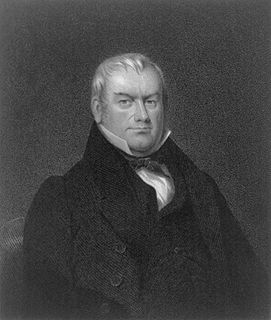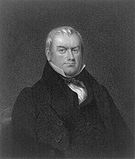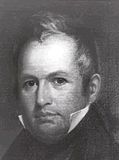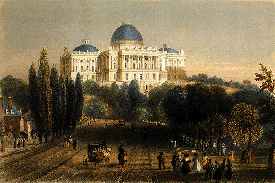
The Twentieth United States Congress was a meeting of the legislative branch of the United States federal government, consisting of the United States Senate and the United States House of Representatives. It met in Washington, D.C. from March 4, 1827, to March 4, 1829, during the third and fourth years of John Quincy Adams's presidency. The apportionment of seats in the House of Representatives was based on the Fourth Census of the United States in 1820. Both chambers had a Jacksonian majority.

The Twenty-first United States Congress was a meeting of the legislative branch of the United States federal government, consisting of the United States Senate and the United States House of Representatives. It met in Washington, D.C. from March 4, 1829, to March 4, 1831, during the first two years of Andrew Jackson's presidency. The apportionment of seats in the House of Representatives was based on the Fourth Census of the United States in 1820. Both chambers had a Jacksonian majority.
Thomas Newton Jr. was an American politician. He was born in Norfolk, Virginia.
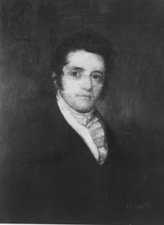
Gabriel Moore was a Democratic-Republican politician and fifth Governor of the U.S. state of Alabama (1829–1831).

John Sergeant was an American politician who represented Pennsylvania in the United States House of Representatives. He was the National Republican Party's vice presidential nominee in the 1832 presidential election, serving on a ticket with Senator Henry Clay.

In the United States House of Representatives elections in 1828, the Jacksonians soundly took control of the presidency, with Andrew Jackson's victory, and greatly increased their majority in Congress. Outgoing President John Quincy Adams's unpopularity played a major role in the Jacksonian pick-up, as did the perception of the Anti-Jacksonian Party as urban and elitist. Major increases in suffrage also heightened Jacksonian wins, as newly enfranchised voters tended to associate with Jacksonian principles. The Anti-Masonic Party, a single issue faction based on distrust of Freemasonry, became the first third party in American history to garner seats in the House.

Elections to the United States House of Representatives for the 20th Congress were held at various dates in each state in 1826 and 1827 during John Quincy Adams' term in office.
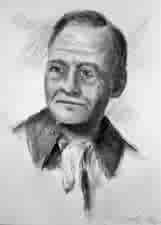
Ephraim Bateman represented New Jersey in the United States Senate from 1826 to 1829 and in the United States House of Representatives from 1815 to 1823.

Enoch Lincoln was a U.S. Representative from Massachusetts and from Maine, son of Levi Lincoln Sr. and brother of Levi Lincoln Jr. Born in Worcester, Massachusetts, Lincoln graduated from Harvard College in 1807. He also served as Governor of Maine from 1827 until his death in October 1829.
The 1829 United States Senate special election in New York was held on January 15, 1829, by the New York State Legislature to elect a U.S. Senator to represent the State of New York in the United States Senate.
In the United States Senate elections of 1828 and 1829, the Jacksonian coalition, despite its leader's victory in the presidential election, lost a seat in the Senate to the opposing Anti-Jacksonian coalition.
The United States Senate elections of 1826 and 1827 were elections that had the majority Jacksonians gain a seat in the United States Senate.
Elections to the United States House of Representatives in Pennsylvania for the 21st Congress were held October 14, 1828. Members of three different parties were elected to the 21st Congress, the first time in US history that a third party won seats. The new Anti-Masonic Party won a total of 5 seats, 1 of which was in Pennsylvania.
Parliamentary elections were held in Norway in 1829. As political parties were not officially established until 1884, all those elected were independents. The number of seats in the Storting was increased from 79 to 81. Voter turnout was 45.3%, although only 5.5% of the country's population was eligible to vote.
A special election was held in Maine's 1st congressional district on September 27, 1827 to fill a vacancy left by the death of William Burleigh (A) on July 2, 1827

The 1828 United States elections elected the members of the 21st United States Congress. It marked the beginning of the Second Party System, and the definitive split of the Democratic-Republican Party into the Democratic Party and the National Republican Party. While the Democrats cultivated strong local organizations, the National Republicans relied on a clear national platform of high tariffs and internal improvements. Political scientists such as V.O. Key, Jr. consider this election to be a realigning election, while political scientists such as James Reichley instead see the election as a continuation of the Democratic-Republican tradition. Additionally, this election saw the Anti-Masonic Party win a small number of seats in the House, becoming the first third party to gain representation in Congress.
The following lists events that happened during 1829 in Chile.

Parliamentary elections were held in Portugal in May 1828.

